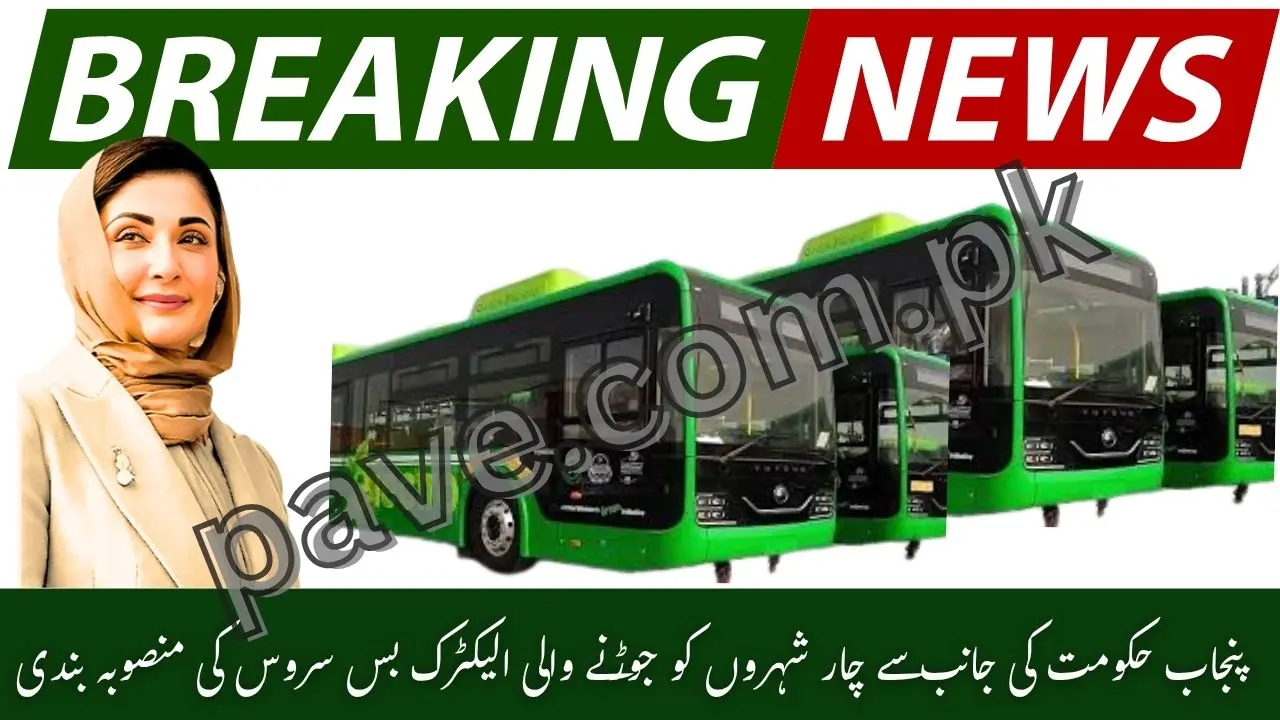Punjab Government Considering Intercity Electric Bus Service for Four Major Cities

The Punjab government is reviewing a groundbreaking proposal to introduce an intercity electric bus service connecting four major cities — Lahore, Kasur, Nankana Sahib, and Sheikhupura — in what could become one of the province’s most ambitious sustainable transport projects to date.
This initiative, suggested by Chief Traffic Officer (CTO) Lahore Dr. Athar Waheed, aims to tackle three major urban challenges simultaneously: traffic congestion, carbon emissions, and rising road accidents.
🌆 Background: Traffic Pressure Mounting in Punjab’s Urban Corridors
According to official traffic statistics shared by CTO Dr. Waheed, around 800,000 to 1 million vehicles and motorcycles enter Lahore every day, while 400,000 to 500,000 vehicles leave the city.
This heavy inflow and outflow has turned Lahore into one of South Asia’s most congested cities, especially during peak hours when travel between neighboring districts becomes a daily struggle.
The situation contributes not only to long commuting times but also to severe air pollution and smog, especially during the winter season. In recent years, Lahore has repeatedly ranked among the top 10 most polluted cities in the world, making it imperative for the government to adopt cleaner mobility solutions.
⚡ Proposal: Intercity Electric Bus (E-Bus) Network
To address these problems, Dr. Waheed has submitted a detailed electric bus (E-bus) network plan to the Commissioner Lahore for evaluation.
The proposal suggests a two-phase rollout:
- Phase 1:
- Launch of electric bus routes connecting Lahore, Kasur, Nankana Sahib, and Sheikhupura.
- Focus on short to mid-range intercity travel under 100 kilometers.
- Bus stops to be set up at major terminals, bus stands, and railway junctions.
- Phase 2:
- Integration of the E-bus network with the metro train system and a planned intercity rail corridor for seamless regional mobility.
- Establishment of charging depots and smart ticketing systems powered by solar energy.
This dual approach aims to make the transport network cost-efficient, low-emission, and digitally managed, aligning with the Punjab government’s Green Mobility Vision 2030.
🌍 Environmental and Economic Benefits
If implemented, the Punjab Intercity E-Bus Service will bring multiple environmental, social, and economic benefits:
- Reduced Carbon Footprint:
Each electric bus can cut emissions by up to 100 tons of CO₂ per year, reducing Lahore’s smog and greenhouse gas output. - Lower Operating Costs:
Electric buses cost less to maintain and operate compared to diesel fleets, leading to savings of 40–50% in fuel expenses for the transport sector. - Cleaner Air, Healthier Cities:
Improved air quality will significantly decrease respiratory illnesses and smog-related health emergencies across the Lahore division. - Job Creation:
The E-bus project will create thousands of technical, driving, and maintenance jobs, including positions in charging station management and battery servicing.
🚏 Planned Routes (Proposed in Phase 1)
| Route | Distance (Approx.) | Estimated Travel Time (E-Bus) | Remarks |
|---|---|---|---|
| Lahore – Kasur | 55 km | 60–70 mins | Ideal for daily commuters |
| Lahore – Sheikhupura | 42 km | 50 mins | High demand for industrial workers |
| Lahore – Nankana Sahib | 78 km | 90 mins | Pilgrimage and local trade route |
| Kasur – Sheikhupura – Nankana | 120 km | 2 hrs 15 mins | Regional linkage route |
These routes will serve as pilot corridors before scaling the service to other major Punjab cities such as Faisalabad, Gujranwala, Sialkot, and Okara.
🏗️ Supporting Infrastructure and Charging Stations
Under the proposal, all E-bus depots and charging hubs will be established near existing bus terminals, metro stations, and industrial zones.
Punjab’s Energy Department and PITB (Punjab Information Technology Board) are expected to collaborate on:
- Installation of fast-charging solar stations along the Lahore-Kasur and Lahore-Sheikhupura highways.
- Deployment of a smart ticketing and GPS tracking system to monitor passenger flow in real time.
- Integration with Punjab Safe Cities Authority (PSCA) for live route surveillance and traffic data sharing.
Check Also: CM Punjab Launches Electric Bus Service in Muzaffargarh 2025 –
🚦 Addressing Smog and Safety Together
Beyond its environmental goals, the electric bus network directly supports Punjab’s Smog Reduction Action Plan 2025, led by Chief Minister Maryam Nawaz Sharif.
Smog-related closures and health warnings have become annual challenges for Lahore, forcing schools and businesses to shut down each winter. By transitioning to zero-emission electric buses, authorities hope to cut the city’s vehicular smog output by nearly 20% in the first two years.
Moreover, E-buses equipped with advanced braking systems, speed governors, and AI-based driver alerts will improve overall road safety — an area where traditional buses have consistently underperformed.
🚌 Government Collaboration and Next Steps
The CTO’s proposal has been formally submitted to the Commissioner Lahore Division for policy review.
If approved, the plan will move to the Punjab Transport Department and Planning & Development Board for feasibility analysis and budget allocation.
Once cleared, the government will invite private companies and electric vehicle manufacturers to participate through a Public-Private Partnership (PPP) framework — similar to the successful Metro Bus and Orange Line models.
The proposed funding structure includes:
- 40% contribution from provincial development funds,
- 30% from private sector investors (bus operators, EV suppliers), and
- 30% through international green financing institutions such as the Asian Development Bank (ADB) and World Bank’s Clean Transport Fund.
🔋 Integration with Punjab’s Broader EV Policy
The project aligns perfectly with Punjab’s Electric Vehicle Policy 2025-2030, which aims to:
- Electrify 30% of public transport by 2030,
- Offer incentives for local assembly of buses and charging equipment,
- Promote the adoption of electric bikes, rickshaws, and loaders under the PAVE Program (Pakistan Accelerated Vehicle Electrification).
The Punjab government has already begun rolling out E-bike subsidies and pilot projects in major cities, showing strong political will to transition toward green mobility.
Check Also: Punjab CM Maryam Nawaz Launches 30 New Electric Buses in Faisalabad 2025
🧭 Expert Opinions
Urban mobility analysts believe that the intercity E-bus network could become a transformational initiative for Punjab’s transport future.
“If properly implemented, this will not only cut fuel imports but also set an example for other provinces to follow,” said transport economist Dr. Saif-ur-Rehman, adding that “the focus should be on renewable charging infrastructure and route optimization.”
Environmental groups have also lauded the initiative, emphasizing that public transport electrification is one of the quickest ways to achieve Pakistan’s COP-28 emission reduction targets.
Check Also: Breaking News: Punjab Launches 1,100 Electric Taxis in Lahore Pilot Project
🏁 Conclusion: Punjab Government Considering Intercity Electric Bus Service for Four Major Cities
The proposed intercity electric bus service marks a forward-thinking shift in Punjab’s urban transport planning. By connecting four of the province’s most active districts through clean, efficient, and affordable electric mobility, the government is setting the foundation for a sustainable transport revolution.
If the plan receives approval and adequate funding, the first fleet of intercity electric buses could hit the roads by late 2026, reducing travel times, improving air quality, and positioning Punjab as a leader in green urban mobility across South Asia.







